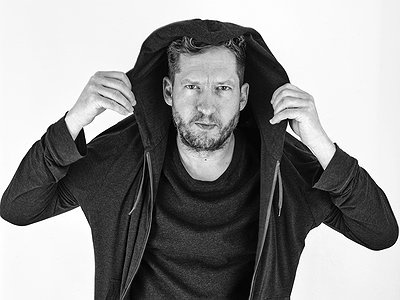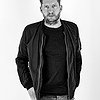Name: Alex Tepper
Nationality: British
Occupation: Producer
Recommendations: Propaganda - A secret Wish and To Rococo Rot - The Amateur View.
If you hear only two albums in your life I personally suggest those. Amazing.
If you enjoyed this interview with Alex Tepper, visit his facebook page for current news and the latest production work.
When did you start writing/producing music - and what or who were your early passions and influences? What what is about music and/or sound that drew you to it?
I started writing music when I was 8. I wrote a melody and gave it to my music teacher and he developed it into a song for the whole class to sing at a school show. That was really my first experience of it but obviously it was much later when I started to right anything professionally, 1994 to be exact. Up until then it was learning how to make music and nothing up until that point was fit for release!
My early musical influence was mostly Electronic Pop, Prince, Howard Jones, Eddie Grant, Stock Aitken & Waterman, and basically anything that Trevor Horn produced. Then a bit later on I got into dance music more specifically from acts like Coldcut, 808 State and Guy Called Gerald, and The KLF. It was definitely the sound of synthesisers and drum machines that excited me and drew me to music the most.
For most artists, originality is first preceded by a phase of learning and, often, emulating others. What was this like for you? How would you describe your own development as an artist and the transition towards your own voice? What is the relationship between copying, learning and your own creativity?
Yes that was true for me. As you say I think most people go through that and to be honest I still do. I think in the early days we call it learning and then a bit later on we call it getting inspired by, and then I think after a long enough time doing this you get the confidence to just start something and see where it takes you. But you’re always still using your inspirations in some way even when you’re just experimenting. I think your brain can’t help but think - oh that sounds a bit like this record or that record and sort of compare it to something you’ve heard before and liked.
What were your main compositional- and production-challenges in the beginning and how have they changed over time?
Early on, the challenges were how to get my records to sound like finished records, like the ones I was being inspired by, and I would keep going in to the studio trying new things writing better bass lines, better melodies etc.
I think now one of the biggest challenges I face is trying to go into the studio and almost forget all of the things I’ve learned over the years and go in like it was the first time again – being a bit ignorant and naive and have that be the leading influence in what I’m working on. It’s a very strange twist of fate as I’d been working so hard for so many years trying to perfect the skills of making records, to now try and forget them all!
What was your first studio like? How and for what reasons has your set-up evolved over the years and what are currently some of the most important pieces of gear for you?
My first studio, technically, was in my bedroom with a set of turntables, Akai s950 sampler and an old Roland sequencer. I didn’t really finish anything in it, it was mostly just for learning, building a sample library (which I still have and use) and just generally messing around.
In those days, I was working part-time at a proper recording studio down the road from where I grew up so I had a much better one I was able to use in its down time. Now my set up has gone full circle actually. I started making records using outboard samplers, synthesisers and drum machines and then when things moved over to hard disc recording on the computer I went towards working more on the Mac, using Logic at that time.
Now, with my current set up, I am surrounded by outboard and analogue synthesisers, eurorack modular set up, Prophet 6, Korg MS20 (and still my old Akais) but I use Ableton Live 10 for capturing them all and then arranging.
How do you make use of technology? In terms of the feedback mechanism between technology and creativity, what do humans excel at, what do machines excel at?
For me it works like Human - Machine - Human.
I’ll set them up in such a way that they can synchronise with each other and one can trigger the next and almost perform a live set with them in the studio and record everything.
The machines in this way excel at having a sonic character, and the older ones specially have some unpredictability to them that I like.
This way of working tends to help you achieve those “happy accidents” in the studio that I strive to get, whatever I’m working on.
Humans can excel at giving something more feel, “the human feel”, and of course, making mistakes which is also good. It’s the imperfections that make something unique and give it character which is what I want to achieve; a sound that isn’t just zeros and ones and “perfect”, but music that has something different to it, something more exciting.
Production tools, from instruments to complex software environments, contribute to the compositional process. How does this manifest itself in your work? Can you describe the co-authorship between yourself and your tools?
My set up consists of mostly outboard and analogue equipment, Eurorack modular system, Prophet 6, Korg MS20, and I use my Akais, MPC2000xl, S950. Ableton Live I use like a creative tape machine to capture it all and arrange, manipulating the audio in a digital way to create something new from it. I like software for that purpose rather than plug-ins that just try to emulate analogue synths.
UADs are maybe the only exception to that but even those I would say if you did AB comparisons wouldn’t quite give you the same results. The beauty of analogue is that you get something slightly different and unique every time you switch it on. Even with UAD you can’t really capture that every time you load an 1176 plug-in for example.
My method with all of this stuff is usually to jam around and record everything and then go through choosing the best bits or deciding what works and what doesn’t. I find working that way gives much more interesting results and possibilities.
Collaborations can take on many forms. What role do they play in your approach and what are your preferred ways of engaging with other creatives through, for example, file sharing, jamming or just talking about ideas?
I work in different ways depending on the project. Some people will give me projects they’ve started and I’ll tweak around, mix them down and maybe add one or two things and then we go back and forth, but this is not the norm. Mostly we get together in the studio and discuss a direction for that day and then jam around with the synths and drum machines and capture the good stuff, then arrange as early as possible and use that as a platform to add more ideas if it needs them. Sometimes it doesn’t and there’s enough there, but you only really know this once a track is laid out with a beginning, middle and end, so I like to get to that point as soon as possible.



